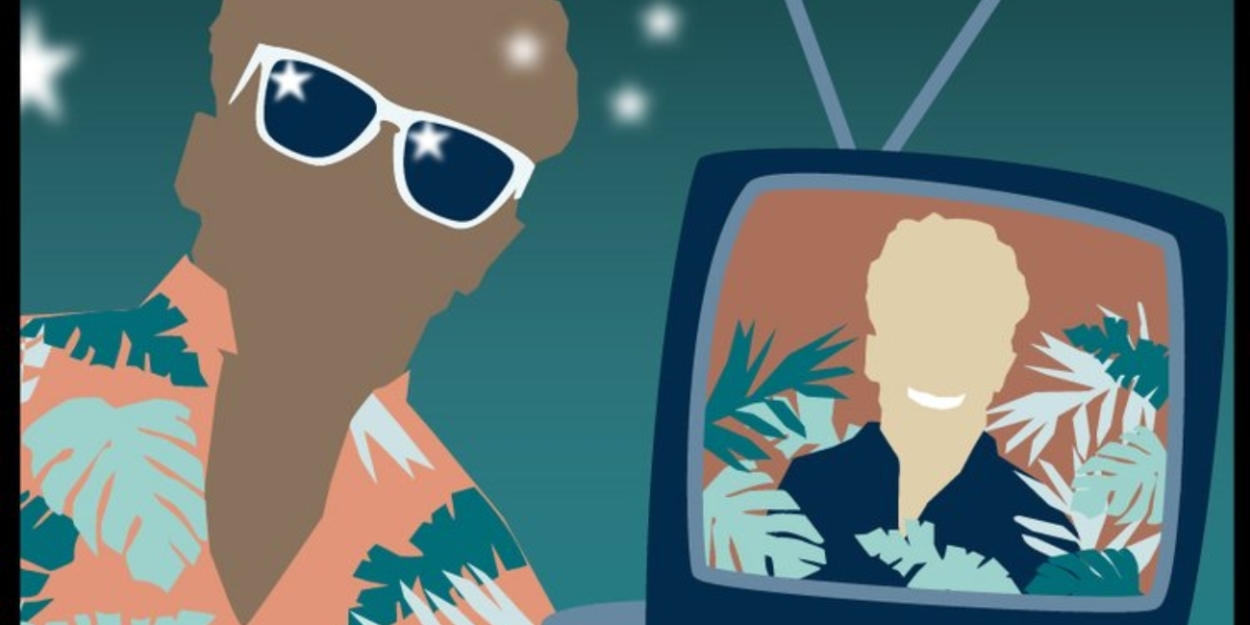
Coming on the heels of two beautiful but heavy shows at Kumu Kahua, Lee Cataluna’s Kimo the Waiter is a markedly lighter romp through a nostalgic look at Hawai’i in the 1980s, set amongst the popularity of Hawaii-set television shows like the original “Magnum P.I.”.
Directed by Jason Kanda, Kimo is staged more cinematically than theatrically, with characters marking scene changes by writing title cards on a whiteboard (substituting for a clapperboard), as well as interstitial scenes of classic Hawai’i commercials of the era, performed live—sometimes with modern asides—by the cast. In addition to these nods to TV tropes, a laugh track makes multiple appearances throughout the show, transforming Kimo’s (the always-excellent Kaipo Dudoit) misfortunes in his life and career into womp-womp moments in a sitcom. This cruel mockery is best embodied in an absurdist take by Michael “Donut” Donato and Angeline Roselani Han, as the two-faced producer Bernard and mercurial star-to-be Carrie respectively.
In what would undoubtedly be a change in lighting or a smash cut if this show were presented on screen rather than in live theatre, Mr. Kanda goes to extremes to highlight the switch between these two characters’ outward, smiling personas and their inward opportunistic vulture personas: Ms. Han flailing dramatically and altering her voice, and Mr. Donato slapping himself in the face to mark these transitions. These jarring choices take the audience out of the moment in the overall storytelling, cynically reminding us that the business of show is a cruel mistress, and that taking yourself too seriously while pursuing a career in entertainment will be inherently demoralizing and demeaning. It is unclear whether that is the overarching intent of the show, but it is certainly the effect.
But it’s not all doom and gloom, from a hysterical bit of a human luggage carousel to the unsinkable optimism and blind support—problematic in its own right—of the absolute delight that is Sharon Garcia Doyle as Kimo’s mom. She is the perfect foil to Dad’s (Reyn Afaga, in my hands-down favorite performance of the show) pragmatic and blunt relationship with his son who bafflingly doesn’t have his sights set on being a welder at the Navy Yard like his old man. This particular parent-child relationship rings deeply true to anyone who’s even dipped a toe in show business, and gives the show a well-grounded throughline for the high and lows of Kimo’s pursuits.
But what makes Kimo the Waiter unique in the sea of stories about show biz is the added layer of difficulty in being kanaka and “the wrong kind of brown” at a time when Hawaiians in media were not able to tell their own stories, and our “representation” was relegated to supporting roles and service staff. Despite being set in the 80s, this is an issue that still has not yet been overcome, though we can safely say that some progress has been made. Kimo’s determination is a small but vital light in this darkness. What success he is able to come by is genuinely celebrated, though the final scene still smacks of the defeatist cynicism prevalent throughout the show. So, while the tone of the show swings between hope and despair, we are still delighted to at last see our local stories told by local people. And though one of the characters makes the claim that “local people don’t watch local shows about local people”, the sold-out and vocal audience I witnessed at Kimo the Waiter very much begs to differ!
Reader Reviews
Videos

